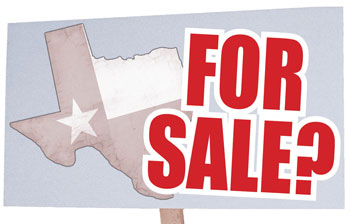Over the last decade, the debacle of the Trans-Texas Corridor made the phrase “private toll roads” dangerous territory for any Texas politician. The plan to create massive toll-road corridors across the state, with foreign companies in charge and millions of acres of real estate at risk of being taken by eminent domain, drew furious grassroots opposition across the political spectrum. That backlash eventually killed the project — but not exactly with a stake through its heart.
One bill now sitting on Gov. Rick Perry’s desk would authorize a slew of new privately operated toll roads across the state. Ironically, the “sunset” legislation was supposed to reform the Texas Department of Transportation, which got in hot water particularly because of the corridor proposal.
 Another bill would allow local and state government entities to put all kinds of public assets — hospitals, water supplies, mass transit systems — into the hands of private entities that could then set user fees and rake off profits for decades to come. What’s more, opponents say, governments would lend public money to make the deals work, leaving taxpayers on the hook if the private profits don’t materialize.
Another bill would allow local and state government entities to put all kinds of public assets — hospitals, water supplies, mass transit systems — into the hands of private entities that could then set user fees and rake off profits for decades to come. What’s more, opponents say, governments would lend public money to make the deals work, leaving taxpayers on the hook if the private profits don’t materialize.
Ellen Dannin, a law professor at Penn State University, has studied the current trend in such public-private partnerships around the country (though not specifically in Texas). She said the convoluted contracts involved in most such deals give private companies so much power that “this is going to make those contractors like a fourth branch of government.”
The same organizers who brought the heat against politicians over the Trans-Texas Corridor are even more furious over the new bills — and vowing to build the same kind of broad-spectrum firestorm this time, if Perry signs them into law.
“I was on a conference call with more than 100 Tea Party groups last week, telling them what this [public-private partnership] bill did, and they are none too happy,” said Terri Hall of San Antonio, founder of TURF (Texans Uniting for Reform and Freedom) and one of the leaders of the anti-corridor movement. “We are educating the grassroots,” she said.
Trey McAtee of Austin, a banker and progressive blogger, is equally incensed by the two bills. “The infrastructure that it took us four generations to build, they are going to try to sell off in one generation,” he said. “This is a shadow way of giving private corporations a way to tax. … I’m as big a capitalist as anyone, but I don’t want that.”
By the time it passed the House in April, the TxDOT sunset bill carried amendments by State Rep. Larry Phillips, a Republican from Sherman, authorizing more than a dozen private toll roads around the state. Phillips did not return a call from Fort Worth Weekly for this story, but he has been quoted as saying that local governments need to be able to enter these kinds of deals because of the lack of public funding for road projects.
State Sen. Mike Jackson, a Republican from La Porte, authored SB 1048, the broader public-private partnership bill. Neither Jackson nor his staff returned a call from the Weekly requesting information on his bill.
Melissa Cubria of the Texas Public Interest Research Group said she was dumbfounded by the lack of opposition to either bill.
State Rep. Yvonne Davis, a Dallas Democrat, was one of the few people to stand against either bill, Cubria said. Davis spoke against the TxDOT bill on the House floor. According to Texas Tribune, after so many amendments were added to the bill authorizing various toll roads, Davis said she was saddened that “we would not be more serious about something everyone says is so critical.”
Cubria said that in the prior sessions, “No one wanted to come anywhere near the words ‘toll road.’ This time, almost no one said a word. … It was just a free-for-all.”
She said that, in a week’s time, she and Hall gathered more than 2,000 signatures and the support of about 100 organizations for a letter opposing the bills, “including just about every Tea Party group in the state.”
She and Hall both noted that Perry has not said anything publicly this year about toll roads or public-private partnership legislation. But Hall said she fully expects Perry to sign the bills.
“Rick Perry is the poster child for public-private partnerships,” she said. “He’s the one that got the legislature to drink the Kool-Aid.”
Perry has until this weekend to either sign or veto the bills. If he does not veto them, they go into effect without his signature. Cubria called on Perry to exercise his veto power for what she called radical bills.
The TxDOT sunset bill “contains no meaningful reforms to the troubled state agency that brought Texans a $1.1 billion accounting error and the Trans-Texas Corridor land grab,” she said in an e-mail. Furthermore, she said, the bill “contains 15 private toll road deals, which the public has protested fiercely … . SB 1420 is a real slap in the face to the public.”
The activists and Dannin, the law professor, all said that much of the danger in the privatization bills lies in the intentionally complicated contracts that governments sign with private companies, as well as in the secrecy that is being allowed to surround them.
Dannin pointed out, for instance, that such contracts typically contain something called an adverse action clause. Such “clauses” can run on for pages and essentially hold the government body liable for any action it takes that lowers the private contractors’ expected revenues. Take, for example, a city that leases its parking garage to a private company and then builds a public transit system that reduces use of the garage. The city could be forced to repay the company for its “lost” income, she said.
“This is going to put a financial thumb on the scale of every decision [the governments] make — how it will affect private contractors’ revenue,” she said.
McAtee, the banker, said that most public officials probably won’t even try to read the fine print of such contracts and wouldn’t catch all the problems if they did. “They are not going to be aware of what they are doing,” he said. Such partnerships make no financial sense unless a government is in such dire straits that “it’s ready to actively sell off the family jewels,” he said.
Hall said that the partnerships remove taxpayers’ ability to influence what amounts to tax rates and the use of their own assets. “What’s really scary and damaging to taxpayers and to property rights is the fact that we as taxpayers can’t pressure the board of directors of a private company if the price of something gets too high,” she said. “It’s basically putting taxing power in the hands of corporations. And that’s tyranny.”
She and others also pointed out that the bills allow much of the information about the deals to be kept secret before and after they’re signed. At least the Trans-Texas Corridor was publicized, Hall said. “They think they can get away with it this time because things are being done in secret.”
While the bills technically do not give ownership of the assets to the private companies, she said, the companies end up with “complete control of the assets” — and with as much power over them as a bank has that holds the mortgage on a home.
She pledged a payback at the ballot box. “If we have our way, we’re gonna throw the bums out,” Hall said. “What’s great for the grassroots this time around — we have redistricting, and every single one of them is going to be up for re-election.”
Dannin said people need to ask themselves why it is so hard for governments to find the money for things like roads and bridges that in the past were built without such tactics.
A big part of the answer, the law professor said, is governments’ increasing unwillingness to increase rates on measures like gasoline taxes to keep them in line with inflation and other factors.
“People are so afraid of raising taxes,” she said. “But there is a price to being anti-tax, and that is selling off the crown jewels and losing democratic control. It is a huge price that people are not taking into account.”











